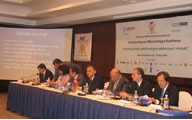
Improving The Legal And Regulatory Framework Of Azerbaijan’s Financial Sector
After the fall of the Soviet Union, Azerbaijan faced a myriad of economic development problems as it transitioned to a free market economy. To help the growing financial sector, ACDI/VOCA’s $6.4 million, USAID-funded Financial Sector Development project increased access to credit by working with banks and nonbank financial institutions, including microfinance organizations, to improve their capacity and increase their access to capital. In addition, the project worked to improve the legal and regulatory framework that affects small and medium enterprise lending.
ACDI/VOCA partnered with the Pragma Corporation, QED Group LLC, and the MBA Enterprise Corps to implement this three-year project, which strengthened several Azeri partner organizations including the Azerbaijan Bank Training Center, the Azerbaijan Microfinance Association, and the Azerbaijan Credit Union Association. The project built local capacity in order to provide a sustainable, local source of training and technical assistance to the Azerbaijani financial sector. In addition, the project sought to mitigate constraints to borrowing and lending, and more broadly, to create a stronger and more competitive financial sector. Initial assessments of constraints revealed that the movable property and collateral regimr and nonbank financial institution regulation, as well as credit bureaus and capital markets, are all in need of further development.
Although foreign and local capital is increasingly available in Azerbaijan, many organizations do not have the technical capacity or expertise needed to manage the available resources. In addition, many smaller institutions are not able to access this capital as easily as larger institutions, like leading commercial banks, because they are relatively unestablished. To improve institutions’ operations and credibility, ACDI/VOCA promoted the use of international ratings, which promote openness and transparency and lead to greater access to funding and technical support. To promote the use of ratings by nonbank credit institutions, including micro, rural, and specialized lenders as well as credit unions, ACDI/VOCA developed a rating support program involving other organizations to share in the cost of the rating process. In addition to the rating program, the project, along with the Central Bank of Azerbaijan, conducted a rating conference in 2007 to increase awareness of the advantages of complying with international rating standards and encourage more institutions to become rated.
On the legal and regulatory front, the project worked to create or improve legislation on mortgages, nonbank financial institutions, cadastre (i.e., the registration of immovable property), and secured transactions. ACDI/VOCA achieved the passage of amendments to the mortgage legal framework by the Azerbaijan Parliament and provided additional support to the Azerbaijan State Registry for Immovable Property to further develop the regulatory system. In addition, the project worked with the credit information bureau to improve its operational draft of the first-ever credit information legal framework. Recently, ACDI/VOCA helped to prepare a nonbank financial institution law, which will soon be reviewed by the parliament.
In addition to the challenges mentioned above, Azerbaijan lacks highly trained financial professionals, who are needed to ensure that Azeri institutions are able to navigate international financial business standards and processes and remain competitive. To address this constraint, ACDI/VOCA launched a multipronged approach to improve and expand the technical support capacity of the Azerbaijan Bank Training Center. One need to be addressed was the acute shortage of qualified accountants in Azerbaijan. With the launch of the Russian-language Certified International Professional Accountant (CIPA) program, ACDI/VOCA and the Azerbaijan Bank Training Center conducted training for financial sector accountants allowing them to obtain certifications. More than 50 accountants from banks and nonbank financial institutions participated in training sessions.





